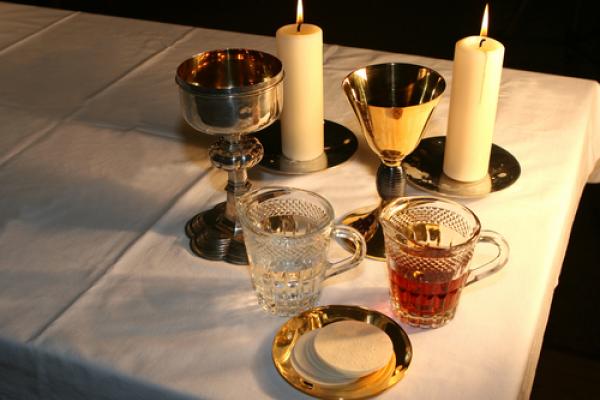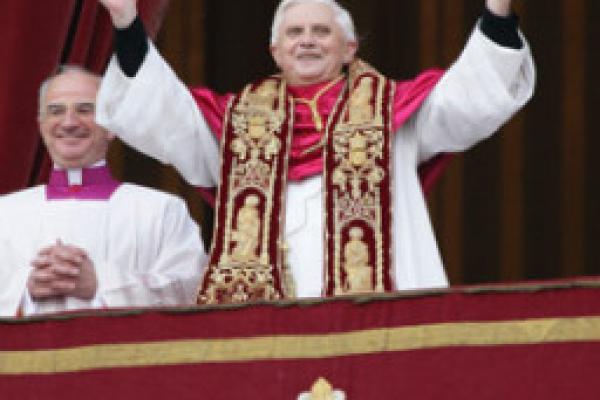Melanne Verveer, the first U.S. ambassador for Global Women’s issues has been urging governments and leaders around the world on improving the lives of women.
As she begins her new journey as the Executive Director of the Georgetown Institute for Women, Peace and Security, she reflected on her tenure as ambassador and the personal encounters that she had along the way that drove her to raise awareness on the sufferings of women. When asked about her guiding principle of women’s advocacy, Verveer cited a conversation she had with an Afghan woman in Kabul,
Please don’t see us as victims but as the women leader we are
To read more about Melanne Verveer’s leadership in empowering women, read here.
So you’ve heard the flu shot is somewhat ineffective this year, and, though you have a normal immune system, you don't want to take the Eucharist from a common chalice.
Part of me kind of wants to slap you.
Obviously, that's not what Jesus would do. We know what Jesus did — he offered you his lifeblood, saying "This is my blood of the covenant, which is poured out for many." Ever after, Christians have taken wine and bread, a sacrament which binds us together in communion with other Christ-followers around the globe and through two millennia.
For the last few months, because my cancer treatment had decimated my immune system, I haven't been able to drink from the common chalice (or to eat most raw food, go to the movies, or get on the bus without a face mask). I really miss it. So I want to share two key insights I’ve had about the common Eucharistic cup.
President Barack Obama will be visiting Israel and Palestine in March. I call on you to write to Obama and tell him that if he is coming to engage Israelis and Palestinians in talks that will lead to a just peace, he is then welcome. Otherwise tell Obama to stay home.
Tell Obama that the world will be watching his upcoming visit and people all over our planet will look to his visit with hope and expectation. Tell him not to disappoint humanity by carrying on U.S. politics in the Middle East as usual.
Tell Obama when he visits us here to stand by the values that he reiterates in almost every speech: freedom, independence, equality, and justice for all.
On the road, listening to NPR's Terry Gross interview Lawrence Wright, author of Going Clear: Scientology, Hollywood and the Prison of Belief, and having recently spent two hours at the United States Holocaust Memorial Museum seeing the Nazis photographed, not in the usual black and white, but in the full colors of the natural world, it occurred that the human impulse to be part of an exclusive group has deep, powerful roots in religion.
People join "true churches" for this same impulse, a motivation that could not be further from the intention of the Gospel, which, at the heart of its mission, contains the abolition of exclusivity of any kind.
Christ following is not about joining the best club, but about following where Christ leads, straight into the company of every person, no matter their situation or circumstances, in order to be a servant to them, one who lays down his or her life, like Jesus, for the life of the world.
We were made for Communion with God and our neighbor, who Jesus tells us is every person.
Scientology, National Socialism, and other cults, past or present, religious or tribal, are modern forms of Gnosticism. They say, in varying ways, "We have something (usually 'knowledge') not publicly available to everyone and you must join us, submit to us, to participate in our secret." It's important to recognize that this is also an offer of power.
Let your religion be less of a theory and more of a love affair. - G.K. Chesterton + Sign up to receive our quote of the day via e-mail
VATICAN CITY — The Vatican on Wednesday confirmed that Pope Benedict XVI is considering changes to church law regulating the election of a new pope, but stopped short of saying whether voting could start earlier than currently planned.
Pope John Paul II’s 1996 Apostolic Constitution “Universi Dominici Gregis” regulates what happens between the death or resignation of a pope and the election of his successor.
It stipulates that the conclave of cardinals must begin 15 to 20 days after the end of the previous pontificate.
But after Benedict’s surprise announcement that he will resign on Feb. 28, several voices within the church have asked for an earlier start to the voting to shorten the time the Catholic Church is left without a leader.
Steven Spielberg’s Lincoln will probably nab a few of its 12 nominated Academy Awards when the Oscars are handed out on Sunday — a sign that Americans never have and probably never will tire of our 16th president.
Abraham Lincoln’s face is etched in stone on Mount Rushmore and his brooding statue sits enshrined in a Greek-style temple in Washington. His succinct Gettysburg Address (about 270 words) took all of about two minutes to deliver, yet remains this nation’s most famous speech 150 years later. His assassination lifted him to mythic status — a martyr who earned his place in our pantheon of national heroes.
We just marked the 150th anniversary of his Emancipation Proclamation, but that necessary action wasn’t enough. Spielberg’s film revives Lincoln’s second act, in 1865, to pass the Thirteenth Amendment to abolish slavery through a divided Congress. It wasn’t the only injustice Lincoln worked to correct.
In his recent book, When General Grant Expelled the Jews, Brandeis University Professor Jonathan D. Sarna recounts an important but little-known event in 1863 in Lincoln’s quest for full civil, religious, and human rights for all Americans — this time, for American Jews.




